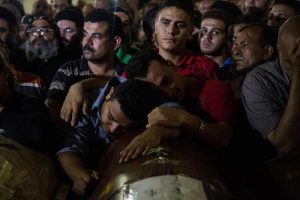The Copts are one of the most ancient Christian denominations in the world, but they are facing worsening violence in their homeland of Egypt
The Copts are native Egyptian Christians, the largest religious minority in the Sunni Muslim country. They make up about ten per cent of Egypt’s population of 95 million, like reported by sbs.com.au.
Large communities of Coptic Christians also live in other countries including Ethiopia and Eritrea. Estimates of the total numbers worldwide vary dramatically, between 16 and 22 million.
Most Copts are members of the Coptic Orthodox Church of Alexandria led by Pope Tawadros II, who is visiting Australia at the end of August.
It is one of the world’s oldest Christian denominations, beginning in the first century AD. Some Copts trace their lineage further back to pharaonic Egypt.
Unlike other Christian denominations, the Coptic calendar is based on the ancient Egyptian calendar, observing Christmas on January 7 and Easter in late April or early May. Worshippers share beliefs and rituals similar to the Greek Orthodox and other eastern orthodox churches.
Violence against Coptic Christians in Egypt has escalated in recent years, and particularly since the ousting of former President Mohamed Morsi in July 2013.
Washington DC think tank the Tahrir Institute has tallied over 400 incidents of sectarian violence against Coptic Christians since 2013. Some international NGOs such as Human Rights Watch have been critical of the Egyptian government for failing to properly prosecute those responsible for the violence.
“There is a long history of Islamic extremists in Egypt targeting Coptic communities,” says Dr Bob Bowker, a former ambassador to Syria and Visiting Fellow at the Centre for Arab and Islamic Studies at the Australian National University.
More recently Islamic State has been actively targeting Copts both in the north and outside of the Sinai peninsula (where most Islamic State activity is concentrated in Egypt). They have claimed credit for a series of deadly attacks including a bomb blast in a Coptic church in Cairo in December 2016 which killed at least 25 worshippers.
Dr Bowker says the Islamic State in Egypt is attempting to exploit and amplify prejudice and division among Egyptians.
“It’s building upon a wider sense within some parts of the Muslim community in Egypt that the Copts are uncommitted to Egypt as a nation; that there is an unfair distribution of wealth and privilege between Copts and non-Coptic Egyptians, which is actually quite false,” he says.
“The socio-economic conditions of Copts in upper Egypt are almost exactly the same as their Muslim counterparts. But nevertheless because the Copts are different they are always going to be a risk of being singled out and victimised in that way.”
In April 2017, just prior to the Catholic Pope Francis’ historic visit to Egypt, Islamic State claimed responsibility for coordinated Palm Sunday church bombings in Tanta and Alexandria which left at least 44 dead. The incidents prompted worldwide condemnation including from Australia’s political leaders.
It was followed by another deadly incident in May when masked gunmen attacked a bus carrying Coptic Christians on a visit to a monastery south of Cairo in Minya province, leaving 26 dead.
On August 10, Egypt’s interior ministry said its forces had killed three jihadists suspected of involvement in the bus attack.
But while Islamic State has claimed responsibility for these recent attacks, some commentators have pointed out that there have been decades of official and unofficial discriminatory policies against Copts in Egypt.
Copts are not widely represented in government or leadership positions, and there are heavy restrictions on building new churches in Egypt while mosques do not face similar requirements.
Amnesty International has condemned President Abdel-Fattah el-Sissi’s government for what it called its “persistent failure” to prosecute those responsible for religiously-motivated attacks against Christians in Egypt.
Egypt’s ambassador to Australia Mohamed Khairat told SBS World News, “We don’t have sectarian violence in Egypt, we have terrorism. There is a big difference. We have a fight against terrorists not only targeting the Copts but all Egyptians, regardless of religion… The fight against terrorism does not end in one or two days. Unfortunately it takes much longer.
“We are trying to provide the churches, the mosques, everywhere – with proper and adequate protection. But as you know Egypt is 100 million people and you can’t prevent terrorist incidents sometimes.”
Dr Bowker says that despite evidence of human rights breaches, the Egyptian government retains broad popular support for its efforts to restore security. The costs of extremists’ violence are falling on Copts and Sunnis alike, he adds.
“Copts would like to see the Egyptian government doing more, they would like to see better security provided,” Dr Bowker says.
“The burden of fighting the Islamic State and its support network in Egypt is shared between both the Coptic community which are its principal targets, and the Sunni Muslim community whose young men are being conscripted and serving in the armed forces and the police, and are suffering very significant casualties in the course of their combat,” he says.



